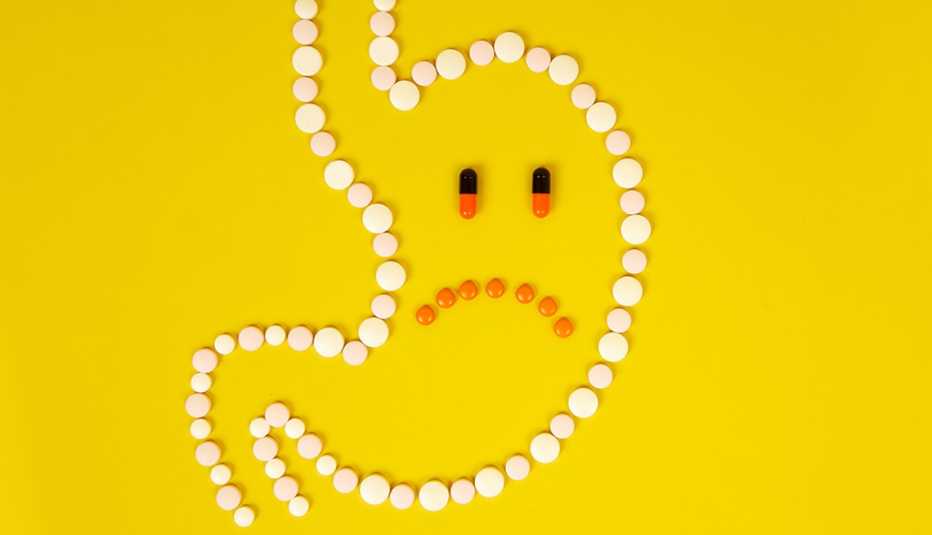AARP Hearing Center


Just when you feel that relief, like you’ve finally figured out how to keep bothersome bloating at bay, it comes back again. And again.
Suspicious foods that can bloat your belly, such as beer, beans or dairy, are not hard to spot — and avoid — once you’ve tracked your meals in a diet journal or app.
But food isn’t the only reason for blowing up. If you’re still wondering why your waistband is bursting, consider the culprits in your medicine cabinet. According to Maria Cardinale-King, a clinical assistant professor of pharmacy practice and administration at Rutgers University, some prescription and over-the-counter drugs may cause or worsen the constipation, gas or irritation that leads to bloat.
“When you are in your 50s and 60s, certain medications, when combined with the other normal changes, like changes in metabolism, can make you more vulnerable to bloating,” she says. “It’s good to consider all the foods you have eaten, but don’t forget any prescription or OTC medications you’ve recently taken.”
Medications That Cause Bloating
- Ibuprofen (Advil), naproxen (Aleve) and other nonsteroidal anti-inflammatory pain relievers
- Statins
- Antidepressants, some used for depression and certain types of pain
- Blood pressure-lowering medication
- Anticholinergics
- Antibiotics
- Opioid pain medication
There’s a decent chance constipation plays a role in your discomfort. Certain medications may cause constipation and, by extension, bloating, according to Spencer Dorn, M.D., vice chair and professor in the division of gastroenterology and hepatology at the University of North Carolina School of Medicine in Chapel Hill. The symptoms are common, often multifactorial and incompletely understood. Various issues, or a combination of them, including a lack of fiber in your diet, contribute to gas and bloating problems, especially if you are already prone to them, Dorn points out.
Take a look at these medications and consider if any of them may be one of the root causes of your digestive distress.
1. Common pain medication
Prescribed or used for: Relief of fever, pain and inflammation from headaches, muscle aches, arthritis, colds and toothaches
Examples: Aspirin (Bayer, Alka-Seltzer Original)
How they contribute to bloating: Nonsteroidal anti-inflammatory drugs (NSAIDs) work by stopping the body’s production of pain-triggering prostaglandins. But they may also suppress beneficial chemicals that help protect the intestinal tract. “These drugs irritate the lining of the stomach, which can cause changes that can result in bloating,” says Cardinale-King at Rutgers University.
Tips: Consider integrative therapies such as heat, cold, acupuncture or exercise to help reduce musculoskeletal pain and the amount of medicine you need. Use NSAIDs only when necessary; follow the instructions and take the lowest effective dose, recommends the International Foundation for Gastrointestinal Disorders. Ask your doctor if alternatives such as lidocaine cream or patches or acetaminophen are appropriate for you and your specific problem. In some cases, taking NSAIDs with food, milk or antacids may help prevent GI side effects, according to the Cleveland Clinic.
2. Statins
Prescribed or used for: Lowering cholesterol levels in the blood
Examples: Atorvastatin, fluvastatin, rosuvastatin (Crestor or Ezallor), lovastatin (Mevacor or Altoprev), pitavastatin (Livalo or Zypitamag), pravastatin, simvastatin (FloLipid or Zocor)
How they contribute to bloating: “The mechanism that connects statins to bloating and gas is not well understood,” says Sherry Torkos, author of The Canadian Encyclopedia of Natural Medicine. One theory, she says, is that statins act on the nerves in the colon, making muscle contractions less effective and, in turn, causing slowed digestion. “When food remains in the colon longer, it can ferment and produce gas and bloating,” she explains.
Tips: Talk to your doctor. People experiencing bloating after starting a medication may want to switch to a different one, according to Dorn. Try taking a walk. “Exercise strengthens muscles in the gut, which improves contractions and stimulates the movement of waste through the colon,” aiding digestion and relieving gas and constipation, says pharmacist Torkos.



































































More From AARP
5 Best Foods to Relieve Constipation
Yes, prunes are #1, but the rest may surprise you. Plus, learn common foods to avoid
9 Best (and 6 Worst) Foods for High Blood Pressure
Help control your blood pressure numbers by watching what’s on your plate
4 Hidden Allergy Triggers
Everyday items may be to blame for your symptoms